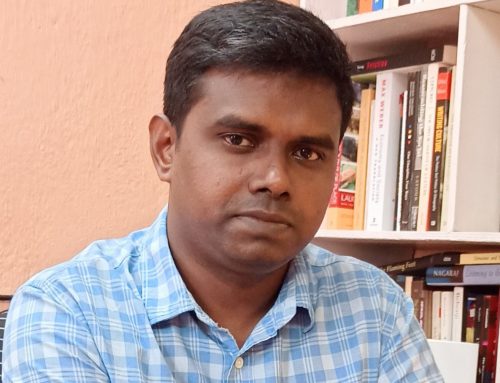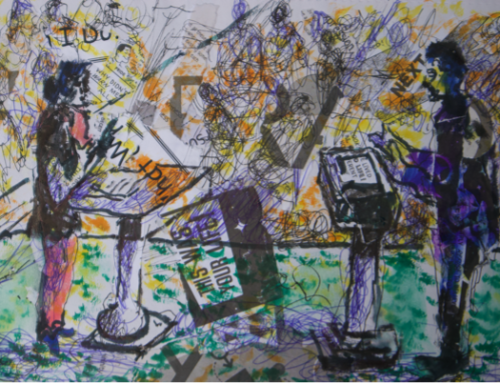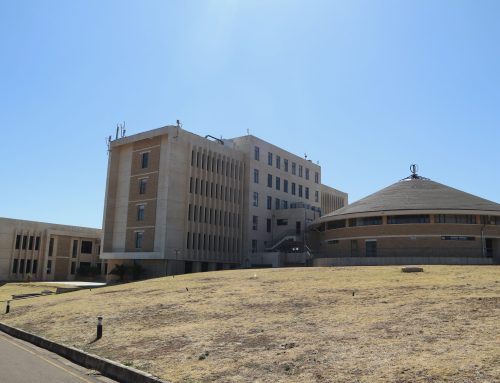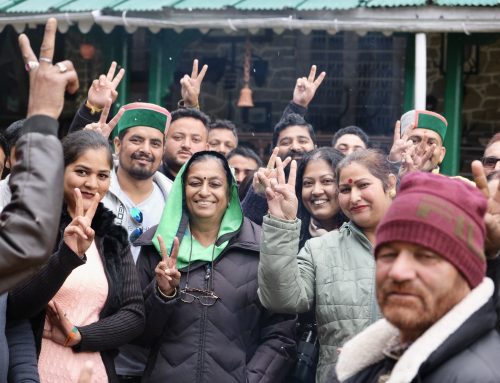Abubeker Yasin Gebro reflects on the changing political landscape in Ethiopia through the Afar people’s experiences and engagements. Since coming to power in April 2018, Prime Minister Dr Abiy Ahmed has introduced a swathe of remarkable and often unexpected reforms. This shift towards democratisation is not without challenges however. Afar people, for example, are vacillating between hopes for a brave new world and discontent at the resurgence of an older-style of politics. For hope to prevail, writes Abubeker Yasin Gebro, what is needed in this critical moment in the history of Ethiopia and of the Afar people is great leadership.
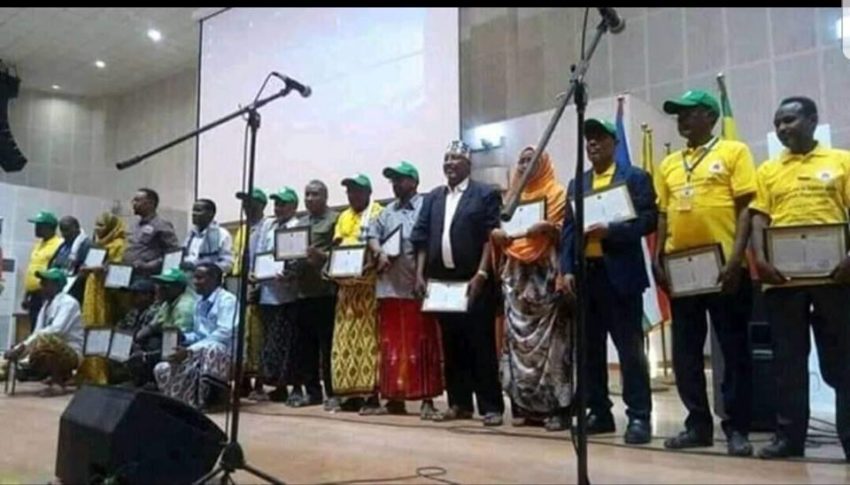
OUTGOING AFAR NATIONAL DEMOCRATIC PARTY (ANDP) LEADERS AFTER THEIR RECOGNITION
PHOTO : FANA BROADCASTING CORPORATE
Prelude
After many years of predicament and vehement struggle of the people, a wind of hope is blowing over Ethiopia. Beyond the imagination of many opinion makers and political analysts, Dr. Abiy Ahmed, the Prime Minister of Ethiopia, emerged as a new saviour of Ethiopia from the womb of Ethiopian People’s Revolutionary Democratic Front (EPRDF). EPRDF is a leftist political coalition of four political parties – the Amhara Democratic Party (ADP), Oromo Democratic Party (ODP), Southern Ethiopian People’s Democratic Movement (SEPDM) and Tigrayan People’s Liberation Front (TPLF). Though the EPRDF is formally a coalition of equals, the TPLF is largely seen as the dominant force in Ethiopian political life since 1991. Since Abiy Ahmed came to the throne of power in April 2018, we have been witnessing sweeping and remarkable reforms – this was astonishing for many but sometimes we should expect the unexpected. However, democratization is not without problems and the changes introduced since April 2018 have created new tensions, not least the daunting challenge of ethnic violence.
With the arrest of Abdi Muhammed (Abdi ille) of the Ethiopian Somali region, many people in the Afar region wished that the wind of change would reach them swiftly too. After 27 years of silence, many Afar youth protesters, through their social movement, secured a pioneering window of opportunity on state owned media (EBC Amharic) to demand a change; and they continued to protest peacefully. Learning from the experience of Somali regional state, slowly but surely, the Abiy administration turned its face to Afar regional state that was so closely attached with the TPLF- dominated EPRDF. For Dr.Abiy the separation of ANDP (Afar National Democratic party that runs Afar politics) from TPLF was not uneasy surgery.
The leadership of ANDP for a while failed to understand the inevitability of the coming change and the warning of Abiy Ahmed. Compelled by the mounting protest and demand of young Afar protesters, regional president Siyoum Awal and the 45 central committee members of ANDP were summoned for an urgent meeting in Addis Ababa. It was an opportunity for Afar leaders to visit the National Palace at Arat Killo where Ethiopia’s political decision making is the sole matter of EPRDF. In November 2018, the Abiy government in clear terms informed the leadership of Siyoum Awal that a change – whose time has come – is unstoppable. Through the spokesman of the Abiy administration, the Afar people were ‘informed’ about the decay and strategic leadership failure of ANDP. Many people were ashamed and taken aback to hear the many self-criticisms of Afar leaders in Addis Ababa.
The ANDP Conference and the Farewell
Compelled to accept the warning by Abiy’s administration and driven by the mounting pressure of Afar Youth protesters, the ANDP held an urgent meeting in December 2018 with it’s over 500 members. The party pledged that it will revitalize itself for the betterment of Afar people. During the first week of the conference 72 of the old guards were removed from the party leadership in ‘honor’ and were handed over a certificate for their contribution to ‘Afar development’. Against the ethos of Afar culture and as it was observed through Afar TV channel, some were being seen crying for the outgoing president.
Unlike the usual gathering, the conference was seen as a last resort and a decisive battle to bring about change. Yet the conference has resulted in a bitter struggle for power between change supporters and those who still want to have a grip on power. The group run by President Siyoum Awol hoped to continue to be in power or wanted to see their supporters hold power. On the other hand, deviating from the ‘democratic centralism’ culture of obeying a single party leader, members of ANDP took the opportunity to vote for new leadership. As a result, the incumbent Ethiopian Defense Minister, Engineer Aisha Muhammad, and Awal Arba were chosen as ANDP leader and President of Afar regional state respectively.
The New Hope and Promise
Though at a snail’s pace, the wind of hope blowing over Ethiopia also reached the Afar periphery. The leadership change within ANDP was seen by many as a new chapter for the Afar people. Mainly, the removal of old guards that were subservient to TPLF ushered in euphoria. Both the supporters and opponents of ANDP felt that they had secured an opportunity that may help them decide on their own matters and destiny. Many people on the street of Samara, the regional capital, revealed their joy and congratulated each other. It was felt like Independence Day.
The new leadership of ANDP pledged that it will relentlessly work for the betterment and emancipation of Afar people. In her victory speech on December 2018 , in Samara, the newly elected ANDP leader Engineer Aisha Muhammad assured people of Afar region it would come out of being ‘backward’, and also attested to working together with opposition groups, intellectuals, youth and the diaspora community. In a similar vein, the new president of Afar regional state, Awal Arba affirmed that better days are coming and that he will work together with Afar youth protesters. Reorganizing the government structure was a priority of the new administration. To this end, 18 new offices have been established to better answer the people’s request and need for development.
Back to Discontent
The freedom of air that the Afars inhaled and exhaled for a while couldn’t pass the test of time. Soon after the announcement of Cabinet and Standing Committee members of ANDP and their placement in government offices, Afar people have begun to seriously question the measures taken. The source of the discontent has its root in how some appointees were able to seize power during the conference and its election processes. The dirty politics game played to win votes and the return of old and ineffective members of the party dashed the hope of many Afars. Despite its rhetoric, the new leadership couldn’t craft a road map towards satisfying the people’s demand for change, and seems it is too late to commence public dialogue in order to build trust.
On the other hand, eruption again of intractable conflict with Issa tribe of Somali in December 25, 2018 diverted the attention of the Afar youth protesters from the struggle for their cause. As the Issa encroachment on Afar land is more than a competition over scarce pastoral resources, from all corners of the region, Afars are now fighting a war that is believed to have the backing of external actors. Against the verdict of the federal government, which orders the special Afar force to pull out of Issa-inhabited towns in Afar, and the call of Awal Arba for a political solution to mitigate the conflict, the Afar youth protesters blocked the main road in the state which is a life-line that runs from Addis Ababa to Djibouti. The central government of Ethiopia seems to be concerned more about the road’s security rather than the human security of Afar people.
Final Thoughts
At this juncture, the wind of hope has blown over Ethiopia and its aroma is reaching Afar. The new dawn in Ethiopian politics seems to open a new chapter for Afar but there needs to be due care on how to manage the change process. It is quite commendable to see ‘fear politics’ fall apart in Afar and be replaced by new hope.
But the new Afar leaders’ way of handling the change, including playing the same old game of political tactics has begun to despair the people’s desire – and need – for a bright future. As a result, the Afar people are saying that the locust has gone but it has already laid its eggs. They still languish in abject poverty and insecurity. Their quest for democracy, justice and development is yet to come.
The Afar people’s hope is to see a clean break with the past and the emergence of a young, educated and servant leadership that could lead by example and bring back power to the people and fulfill their aspirations. It is a great moment that requires great leadership. No more, no less. Let’s hope for better.
Abubeker Yassin, who hails from the Afar pastoralists of Ethiopia, holds an MA in International Relations from Addis Ababa University and is a co-founder of Samara University where he currently lectures in social sciences faculty . His research focuses on state-making and human security particularly in the Horn of Africa.

